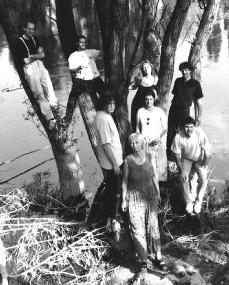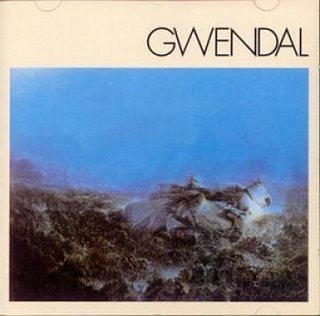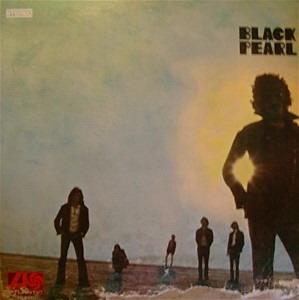Kolinda plays complex folk music with diverse instru mentation and with medieval and Eastern influences. They lived in France for a time, and were produced by
Hughes de Courson of the French folk group
Malicorne. Kolinda disbanded in 1979, only to reform five years later.
After playing as a group for 11 out of the past 16 years, with 7 albums under their belts, Kolinda is still relatively unknown in their native Hungary and virtually unheard of in North America.
"They're one of the most interesting European groups that I've heard," says Gary Cristall, organizer of the Vancouver Folkfestival, "but they do it in a different way. Even though they were doing traditional stuff, it had a different edge to it. They've never been looked on very favorably in Hungary. They were always a little too far outside."

Kolinda's reputation for being outside comes from the way they mix elements of Hungarian and Balkan folksongs with a large amount of jazz, a bit of classical, and even a few notes of rock. Their music manages to melt the passion and urgency of gypsy music with the cerebral with of cool jazz, an exciting combination that makes them one of the most successful hybrids of folk and contemporary music around today.
Kolinda first formed in 1974, and in the next four years they released three albums on the French Hexagone label. But in 1978 the group disbanded and the members went on to other projects.
In 1984, the group got together for a reunion tour. They've been playing together ever since, and have recorded four albums. But even with their diverse sources of inspiration , Kolinda never sounds contrived.
While other "ethnofusion" bands often seem like a patchwork of styles and cultures - contemporary instrumentation precariously and arbitrarily tacked on to ethnic folk music - Kolinda always sounds inevitable. They weave all their various influences together so seamlessly that it somehow seems as if it could be no other way. Their sounds is a solid, unified whole that blends fervor and freshness without a hint of artifice.
Contact:
László Kovács
Kick-butt underrated Hungarian band. They probably don't like to call themselves progressive but they're just as progressive as most other 70's output. They're also very innovative. Masterminded by their founder Peter Dabasi, Kolinda invites you to partake in their sometimes insane, sometimes beautiful, sometimes hypnotic world of Hungarian folk and gypsy prog which includes a plethoria of exotic instruments, bombastic (at times) female/male vocal harmonizing, sometimes beautiful vocal harmonizing, etc. I cannot say enough good things about Kolinda. Everyone talks about
Solaris and/or
After Crying being the two primary bands from Hungary. Truthfully, Kolinda is every bit as good if not better.
They've been around since 1975 and have released a bunch of albums. Their 2nd and 3rd albums (1514) are probably their best but (unfortunately) hopelessly out-of-print. Their 2nd was on CD with the French Hexagone label and their 3rd (1514) was never released on CD but God knows they're better than tons of albums out there on CD.
They are still alive and recording even today and their latest Elfelejtett Istenek ("Forgotton Gods") is excellent and very 1970's sounding. -- Betta
Discography:
Kolinda (76)
Kolinda 2 (77)
1514 (79)
Makám & Kolinda (82, as Makám & Kolinda)
Szélcsend után (??, as Makám & Kolinda)
Úton (84, as Makám & Kolinda)
Kolinda 6 (88)
Transit (91)
Ösz (96)
Ráolvasás / Incantation (97)
Elfelejtett Istenek (00)
Members: Ferenc Kiss (violin), Péter Dabasi (tamboura, guitar, gadulka, vocals), Ágnes Zsigmondi (vocals, flute), Iván Lantos (vocals, bass, percussion, flute, bagpipes), András Széll (vocals, violin, 1975-79), Dóra Kovács (vocals, violin, flute, 1975-79), Ferenc Molnár (kaval, Turkish oboe, 1977-78), Attila Zombori (darbouka, percussion, 1978-79), Szőke Szabolcs (gadulka, 1978-79)
 Makám & Kolinda - Szélcsend után (1984)
Link
Makám & Kolinda - Szélcsend után (1984)
Link
 Kolinda - 6 (1987)
Link
Kolinda - 6 (1987)
Link
1. Nyolcsoros eight lines
2. Félek: Bevezetõ fear: prologue
3. Félek: Vers fear: verse
4. Félek: Befejezés fear: epilogue
5. Pastor ludens pastor ludens
6. Hajdut énekek hajdukt songs
7. Számum hot dry sandstorm
8. Ébredés #1 awakening
9. Ébredés #2 awakening 2
10. Forgó öt turning five
11. Lépések a tûz körül #1 dancesteps around the five
12. Lépések a tûz körül #2 dancesteps around the five 2
13. Bolgár kitérõ bulgarian detour
14. Alkonyat virradat sunset sunrise
15. Túl késõ too late
 Kolinda - Ráolvasás / Incantation (1997)
Link
Kolinda - Ráolvasás / Incantation (1997)
Link
1. Hármasugrás
2. Szótlan dallamok
3. Ráolvasás
4. Álom-tó
5. Botladozva
6. Elégia
7. Kötõdések
8. Hétrõl hétre
9. Négyszemközt / Air az ötben
10. Tivadar - hommage á Jacob van Eyck
11. Vadorzó
12. Románc
13. Coda
14. Újra együtt

 With just an album with their name, and no mention of their identity, Elektriktus are a mysterious group that only released an LP on the PDU label in 1976. The LP was recorded in Italy, but there's no proof that the group was really from Italy.
With just an album with their name, and no mention of their identity, Elektriktus are a mysterious group that only released an LP on the PDU label in 1976. The LP was recorded in Italy, but there's no proof that the group was really from Italy.














































































